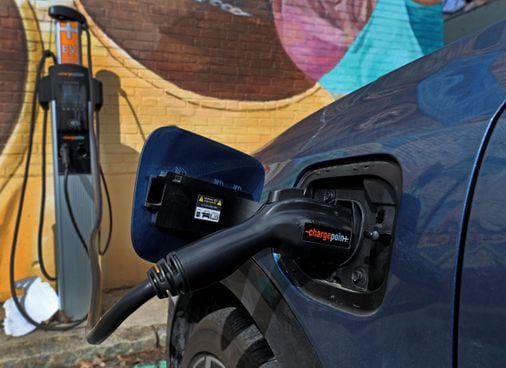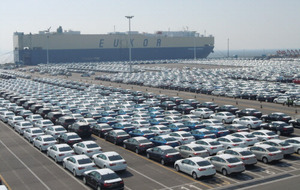More EV chargers for Massachusetts proposed in bill

The Massachusetts Senate’s proposed climate law is packed with good news for current and future electric vehicle drivers.
The draft proposal would provide millions of dollars annually for rebates on EV purchases, legalize and promote lower-cost EV chargers mounted to utility poles, and make it easier to install chargers in many residential locations.
The Senate bill is just the start of efforts to reform the state’s climate and EV policies this year, but the proposal is expected to receive backing from House legislators and Governor Maura Healey. Still, details of the bill could change and provisions could be dropped as it makes its way through the legislative process.
Senator Mike Barrett, who led drafting the chamber’s bill, said the goal was to update a multitude of Massachusetts laws that have been holding back EV charger installations and EV adoption, from rules governing condominiums and historic districts to electrical standards and plumbing codes.
“We are trying to move across a range of issues and address each one where it lives in the state’s laws,” Barrett said. “If you leave something out you’re going to freeze the process in place and significantly inconvenience purchasers of EVs.”
Barrett said the bill would likely be amended to designate a lead agency in the state to be responsible for EV charger deployments. Legislators are discussing which agency should take the lead, he said. “Right now, no one agency in state government is driving the expansion of EV charger infrastructure,” he said. “There are a lot of cooks in the kitchen but no head chef.”
Environmental advocates welcomed the EV provisions in the bill; shifting almost 1 million drivers away from gas-powered vehicles by 2030 is a key part of the state’s plan to reduce carbon emissions. The transportation sector is responsible for 37 percent of emissions, the most of any sector in the state economy.
The bill is “another strong step forward . . . to comprehensively develop and implement a network of electric vehicle chargers and infrastructure that touches all parts of Massachusetts,” said Kyle Murray, Massachusetts program director at the nonprofit Acadia Center in Boston.
The state already offers rebates of $3,500 for the purchase of new EVs that cost $55,000 or less and used EVs that cost up to $40,000. Instead of relying on annual budget allocations to pay for rebates, the bill would provide $27 million per year through 2027 from a trust fund backed by emissions cap auction proceeds.
The bill also moves to undo an unintended consequence of an earlier law regulating EV charging equipment. The 2022 climate law required EV chargers to meet a specific federal EnergyStar standard but equipment used for pole-mounted chargers didn’t qualify. That meant towns and cities couldn’t install chargers on poles, which can cost half as much as installing ground mounted chargers.
In addition to loosening the standards for EV charging equipment, the bill would require that the state’s Department of Public Utilities make rules encouraging the use of pole mounted chargers. Regulated utilities would have to file plans with DPU by the end of 2025 describing how they would publicize and pay for pole mounted chargers.
The bill also includes provisions allowing condo associations to install EV chargers in common areas and assess condo owners for the cost. And historic district commissions, neighborhood groups, and home owner associations would be prohibited from blocking residents wanting to install EV chargers.
The bill would also give additional responsibilities to the interagency working group known as the Electric Vehicle Infrastructure Coordinating Council, which includes the heads of transportation, energy, and other state agencies. The group was initially established to report on EV charger installation progress and concluded last year that the state would need about 10,000 fast chargers by 2030 to meet demand, 10 times the current amount.
Among other tasks, the council would have to ensure timely rollout of EV chargers under the federal National Electric Vehicle Infrastructure program. Massachusetts can use about $60 million from the program for chargers on highways, but unlike many other states has yet to contract for construction of a single station.
Aaron Pressman can be reached at aaron.pressman@globe.com. Follow him @ampressman.



